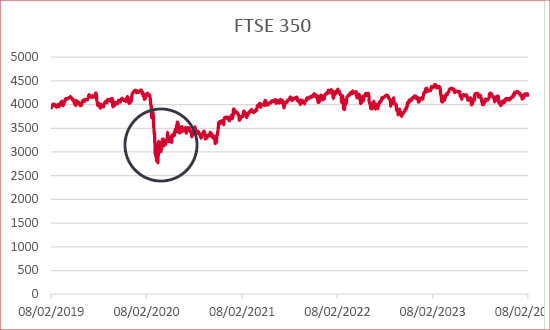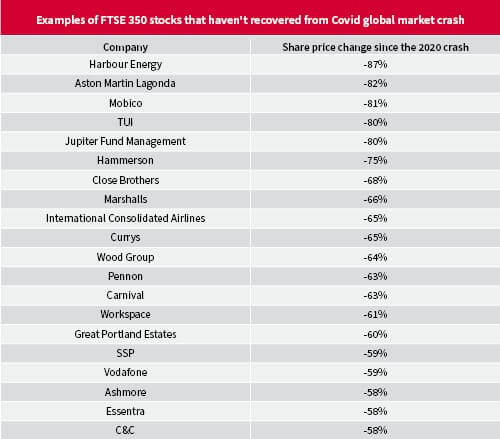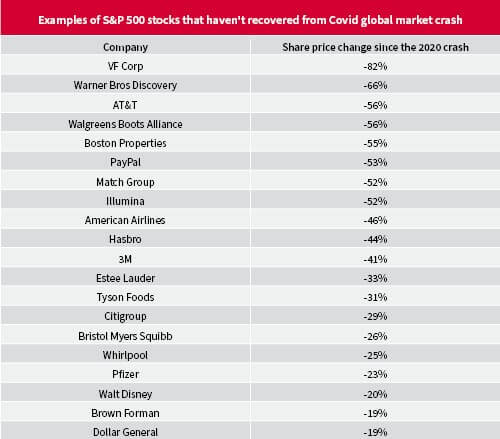


Shares in hundreds of UK and US-listed companies have not fully recovered since the Covid-19 pandemic triggered a global stock market crash in February 2020, even though most major market indices are now trading above that level.
According to SharePad data, 196 stocks in the FTSE 350 and 149 stocks in the S&P 500 are still trading below the day before markets crashed four years ago (21 February 2020).
How major indices have performed since the Covid global market crash

Source: SharePad. Data 21 February 2020 market close to 9 February 2024
In contrast, the FTSE 350 is now trading 0.3% higher while the S&P 500 has achieved significantly greater returns, up 50%. On a broader basis, the FTSE 100 is trading 3% ahead while the Nasdaq index in the US is up 65%. Even other parts of the world are thriving – France’s CAC 40 is 27% ahead and Germany’s DAX is trading 25% higher, for example.
The FTSE 350 has recovered from the 2020 global market crash but more than half of its members are still lagging

Source: LSEG
Anyone looking at the performance of these equity indices might think Covid is now a blip in the minds of management teams. However, the large group of laggards implies Covid continues to be the root cause of problems despite countries now learning to live with the virus.
There are multiple reasons why so many share prices have languished over the past few years and failed to fully recover. For certain companies, financial gains made during the pandemic effectively brought forward earnings growth and this demand momentum has now fizzled away, making it harder for these companies to sustain earnings growth.
Builders’ merchant Travis Perkins looks to be one of the companies nursing a hangover as home improvement projects become less important now more people go back to the office for work. The ‘do it for me’ scene boomed after lockdown as homeowners wanted tradesmen to spruce up their houses and flats. This trend has since lost momentum and Travis Perkins has also suffered from a downturn in the construction market led by weaker new-build housing.
Examples of FTSE 350 stocks that haven't recovered from Covid global market crash

Source: SharePad. Data 21 February 2020 market close to 9 February 2024
Supply chain problems during the pandemic fired up inflation and Russia’s invasion of Ukraine exacerbated the situation, leading to a rapid increase in interest rates. Companies had to take on extra debt during the pandemic and the subsequent action by central banks on interest rates has put pressure on corporate finances. Those having to refinance over the past few years, or those on floating rates, have really felt the pain as the cost of servicing borrowings has shot up.
Higher labour and energy costs have eaten into profit margins, particularly for companies lacking the strength to fully pass on these extra costs to customers.
Inflation combined with other negative factors created a cocktail of problems, just as Direct Line experienced. Having already felt the pressure of high inflation making it expensive to fix cars damaged in accidents, a higher-than-expected number of insurance claims weighed on Direct Line and left its balance sheet weaker, which prompted management to cancel its dividend. These factors pulled down the stock price, explaining why its shares are trading well below pre-Covid levels.
Companies had to raise new money during the pandemic if they were unsure how long their funds would last. A reduction or complete absence of income meant relying on cash savings and / or debt would weaken their balance sheets, and so it became common for companies to issue new shares to raise additional cash. Doing so increased the share count which effectively watered down existing investors’ ownership.
SSP was among the companies to have issued new stock during the pandemic and it is still trading below its pre-Covid levels. The average share count for the travel hub food and drink seller went from 458 million in the year ending September 2019 to 697 million two years later.
The travel industry has had a lumpy recovery over the past few years. While demand has certainly bounced back, cost pressures have weighed on earnings and certain companies in the sector such as TUI are still trying to pay down large debts amassed during the pandemic.
Certain drug companies prospered from the pandemic thanks to developing vaccines. They managed to keep the momentum going until last year when it became clear that income from Covid-related treatments was not the golden goose previously thought.
Pfizer and Moderna have both said in recent months that sales from Covid treatments would be much less in 2024 than in previous years. Shares in Pfizer are now trading below the lowest point in the February / March 2020 global market crash. As for Moderna, its share price rallied hard for a year after unveiling its Covid vaccine in 2020 but the bulk of those gains have faded away. Nonetheless, its shares still trade above its pre-Covid levels.
Interestingly, the pharmaceutical sector is experiencing divergent fortunes. While Pfizer and Moderna are in the doldrums, companies with exposure to weight-loss treatments have enjoyed a share price rally. There might be more similarities with the pandemic than you think. Investors initially scrambled to own stocks exposed to Covid treatments in the belief that earnings would soar. The same now applies to weight-loss treatments.
Examples of S&P 500 stocks that haven't recovered from Covid global market crash

Source: SharePad. Data 21 February 2020 market close to 9 February 2024
Elsewhere, spare a thought for asset managers as inflation and the sharp increase in interest rates have created choppy market conditions since the onset of Covid for equity and bondholders. Investors taking money out of investment funds and parking it in cash also created significant outflows for asset managers.
The likes of Jupiter and Ashmore are nowhere near reclaiming all the share price territory lost since the start of the Covid market crash. A pick-up in markets would be helpful to these stocks but otherwise they still face considerable headwinds as sentiment remains poor towards the sector.
Past performance is not a guide to future performance and some investments need to be held for the long term.
This area of the website is intended for financial advisers and other financial professionals only. If you are a customer of AJ Bell Investcentre, please click ‘Go to the customer area’ below.
We will remember your preference, so you should only be asked to select the appropriate website once per device.